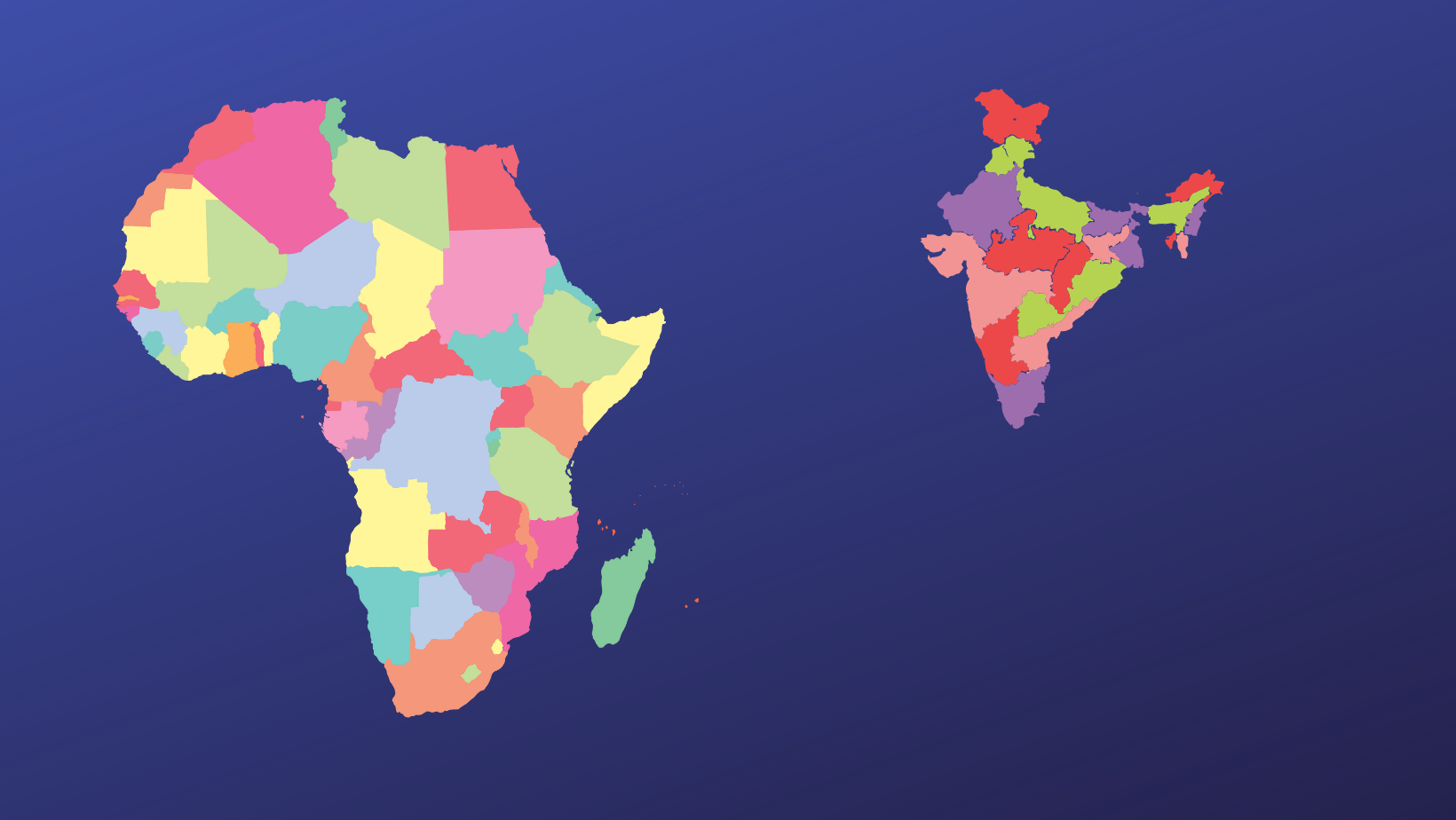Prioritizing Africa in India's Global South Perspective

- 30 Mar 2024
Why is it in the News?
As Africa houses three-fourths of humanity and over 39 percent of the global GDP, there's a growing call to reform existing structures towards a more inclusive and representative system focused on development.
Context:
- President of India, Droupadi Murmu's trip to Mauritius underscored the significance of India's ties with African nations, particularly emphasizing Mauritius' role as a pivotal partner in the Indian Ocean Region.
- This visit reflects India's expanding involvement in Africa, characterized by joint initiatives in community development and the inauguration of critical infrastructure projects.
- As India endeavors to bolster its standing within the Global South, it becomes imperative to comprehend the diverse facets of the India-Africa relationship, analyzing the potential opportunities it offers and the necessity for enhanced collaboration.
Analyzing India's Comprehensive Engagement with Africa:
- Investments and Trade: India's commitment to Africa is evidenced by its burgeoning investments, which soared to $98 billion in 2023, reflecting its confidence in Africa's economic potential and its dedication to nurturing enduring partnerships.
- Bilateral trade between India and Africa has surged to $100 billion, spanning diverse sectors like agriculture, manufacturing, technology, and services, catalyzing economic growth and diversification in both regions.
- Developmental Projects: India's involvement in Africa extends to diverse developmental initiatives, encompassing infrastructure, healthcare, education, agriculture, and renewable energy sectors.
- By spearheading such projects, India not only fosters economic progress in Africa but also cements diplomatic ties and goodwill.
- Export of Scalable Solutions: Drawing on its expertise in cost-effective and scalable solutions, India has played a pivotal role in addressing various challenges confronting African nations.
- Through initiatives spanning from eco-friendly housing to solar energy technology, Indian entities contribute to poverty alleviation and sustainable development, bolstering India's reputation as a dependable partner committed to mutual progress.
- Mutual Prosperity and Development: India and Africa mutually benefit by capitalizing on each other's strengths and resources.
- While India's investments stimulate economic growth, generate employment, and facilitate technology transfer in Africa, African markets offer India access to vital natural resources, new markets, and strategic collaborations.
- This symbiotic relationship fosters economic resilience, innovation, and inclusive growth in both regions.
The Strategic Significance of India's Advocacy for Africa's Representation in Global Arenas:
- Enhancing Africa's Representation and Influence India's active advocacy for Africa's presence in global governance platforms underscores its dedication to amplifying the voices of developing nations.
- Recognizing Africa's substantial population and economic contribution, India emphasizes the necessity of its representation for a fairer and more inclusive international system.
- Initiatives like supporting the African Union's inclusion in the G20 highlight India's acknowledgment of Africa's pivotal role in shaping global agendas.
- Driving Reform and Adaptation Amidst evolving global challenges, there's a growing impetus for adapting governance structures to address emerging issues and foster sustainable development.
- India's push for Africa's participation in global forums reflects its commitment to reforming institutions like the United Nations, International Monetary Fund, and World Bank to better reflect the interests of developing nations.
- Fostering Strategic Partnerships India's advocacy for Africa's representation in global governance is not only driven by altruism but also strategic considerations.
- Recognizing Africa's increasing influence, India seeks to cultivate strategic partnerships with African nations to advance its global interests.
- By supporting Africa's involvement in decision-making processes, India enhances its diplomatic influence and strengthens its position as a leading voice in the Global South.
- Advancing Development Goals: Aligned with its broader development agenda, India's advocacy for Africa's representation in global governance focuses on priorities such as poverty alleviation, sustainable development, and inclusive growth.
- By championing Africa's interests in international forums, India aims to address systemic inequalities and advocate for policies benefiting vulnerable populations.
- This advocacy spans various domains, including trade, finance, climate change, and peace and security, reflecting India's commitment to fostering a more equitable world order.
Exploring India Africa's Rich Historical Bonds and Charting a Path for Future Collaboration:
- Legacy of Colonialism and Struggle for Liberation: India's historical relationship with Africa is deeply rooted in its fight against colonialism, with both regions sharing similar experiences of exploitation and oppression under European rule.
- India's support for African liberation movements during the colonial era solidified a bond based on shared values of freedom and sovereignty.
- Cultural Exchange and People-to-People Connections: Centuries of interaction between Indian traders, scholars, and missionaries with African societies have left enduring cultural legacies, enriching both regions' traditions and languages.
- Today, vibrant Indian communities contribute to Africa's cultural diversity and economic vitality, fostering mutual understanding and cooperation.
- Commitment to Development and Capacity-Building: India's engagement with Africa in development cooperation dates back to its early days of independence, with a focus on providing technical assistance and capacity-building support.
- Continued collaboration in sectors such as education, healthcare, agriculture, and infrastructure underscores India's enduring commitment to Africa's progress and prosperity.
- Exploring Economic Opportunities and Innovation: With Africa emerging as a dynamic economic hub, India stands poised to deepen its economic ties by leveraging historical bonds and cultural affinities.
- Opportunities abound for enhanced trade, investment, and technology exchange, benefiting both regions and driving sustainable development.
- Forging Strategic Partnerships in a Changing Global Landscape: Amid geopolitical shifts, India and Africa have the chance to strengthen strategic alliances grounded in shared values and interests.
- By aligning diplomatic efforts and leveraging their collective strengths, both regions can wield greater influence on global issues like climate change, terrorism, and pandemics, fostering a more equitable and inclusive world order.
Conclusion
The multifaceted partnership between India and Africa presents abundant prospects for economic, political, and social collaboration. In India's pursuit of leadership within the Global South, fostering closer ties with African nations emerges as imperative. Amidst the swiftly evolving global landscape, the alignment between India and Africa signifies a potential for mutual prosperity and advancement
